Predicting Fertility Is Now Easier than Ever: Meet the Revolutionary me.mum!
May 24, 2021 - The new method, me.mum, only needs a drop of saliva for analyzing hormones and predicting fertility. The project aims to present a reliable solution for all women and couples who are planning a pregnancy or trying to conceive but are experiencing difficulties.
As we hear about the latest technological advances and discoveries, the first thing that comes to mind might be a Tesla truck or a new social network available in the app store. Thus, we wonder, what purpose does technology serve? We believe, therefore, that today's progress in the technology industry is dictated by the latest trends, whims, and social needs of the human being (and it is worth clarifying that it is not all bad).

me.mum
But it also depends on where we look, because not every day people and ideas appear willing to change the course of, for example, the way we know about family planning and predicting fertility. A Croatian entrepreneur, based on her life experience, decided a few years ago to take action on the matter and revolutionize the way in which women can better know their bodies and plan the desired pregnancy with their partners through an innovative method, and it only requires an easy-to-use device and a mobile application.
In 2015, after two years of expectations, disappointment, and hopes, Maja Bujas felt pushed towards four years of developing me.mum, which is an innovative portable fertility monitor and app that can accurately predict women's fertile days by analyzing the levels of luteinizing hormone (LH) from saliva. Its technology is built from scratch, and provides personalized insights into women's hormone profile, and detects the most fertile days, which significantly increases the chance of conceiving. Chances of getting pregnant are higher when women can identify their fertility window. me.mum combines the most popular methods of determining the fertile days: period calendar and measuring luteinizing hormone (LH) from saliva, instead of urine.

Maja Bujas, founder of me.mum
After conceiving the idea, the research and development stage followed. In 2017, the first functional models and app were designed. In the two following years, two prototypes of me.mum were developed, and in December 2020 the final product was completed. That way, after four years of development and two prototypes, Maja can finally share one simple to use solution for all women and couples who are planning a pregnancy or trying to conceive but experiencing difficulties. When you are trying to conceive, the most important thing is to determine your fertile days. With me.mum you will do it easily and simply.
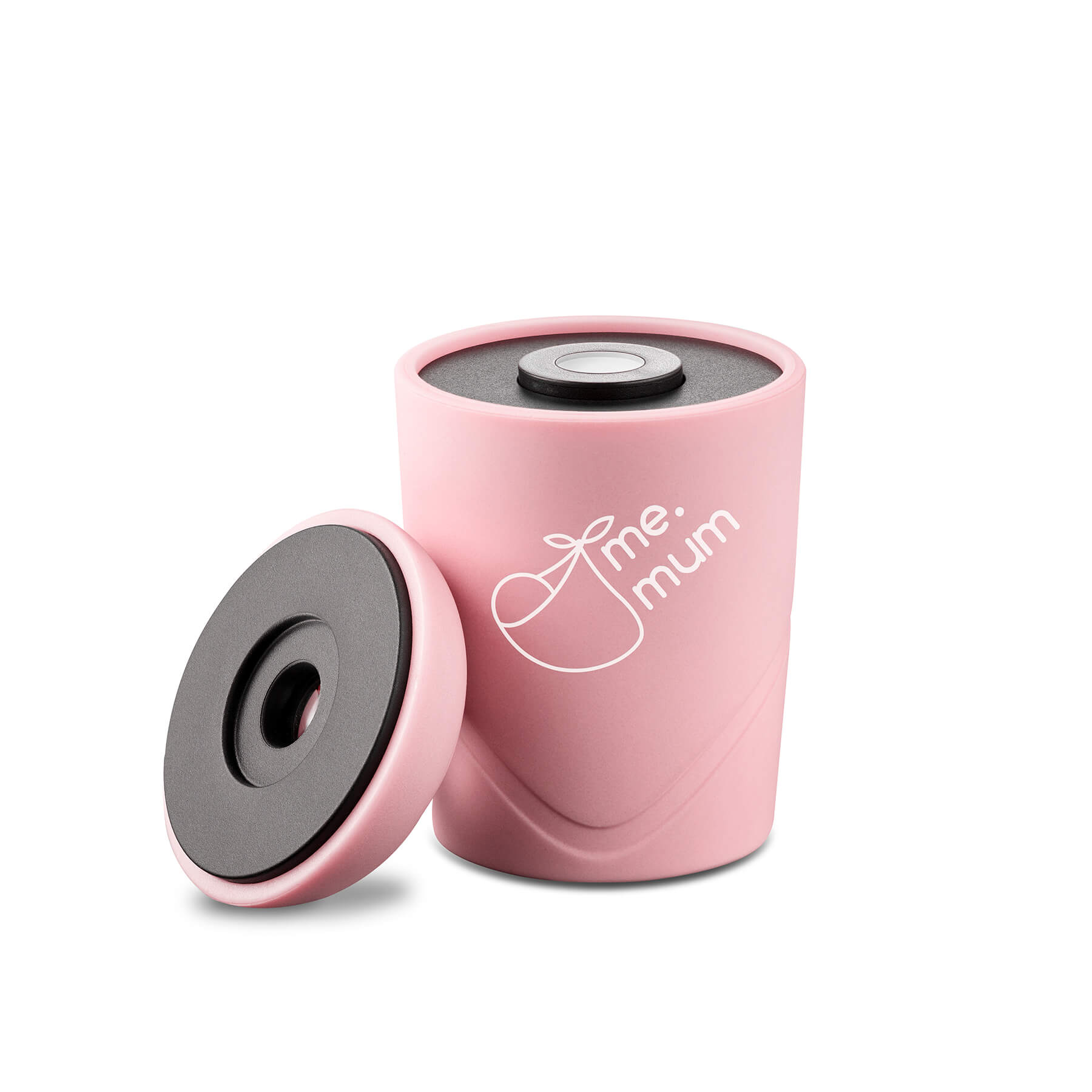
Its use is very practical and easy to learn for all those interested in predicting fertility in few steps. The best time to use me.mum is in the morning, but you can use it during the day too. Before using, it is important not to eat or drink anything, except water. That way your saliva will be clean. According to Maja and her team of developers, the process of using me.mum can be summed up in only three easy steps!
Currently, the product is already on sale in the early-bird mode, in which all those interested in buying it can access an exclusive price. The market price will be €119, but at this time one can order it through two packages: one for €59, which includes the smart fertility monitor device and the me.mum app. The other, for €69, also includes an online nutrition course for boosting your fertility. The estimated shipping date worldwide will be July 2021. The app will be available as soon as the first me.mum devices are delivered.
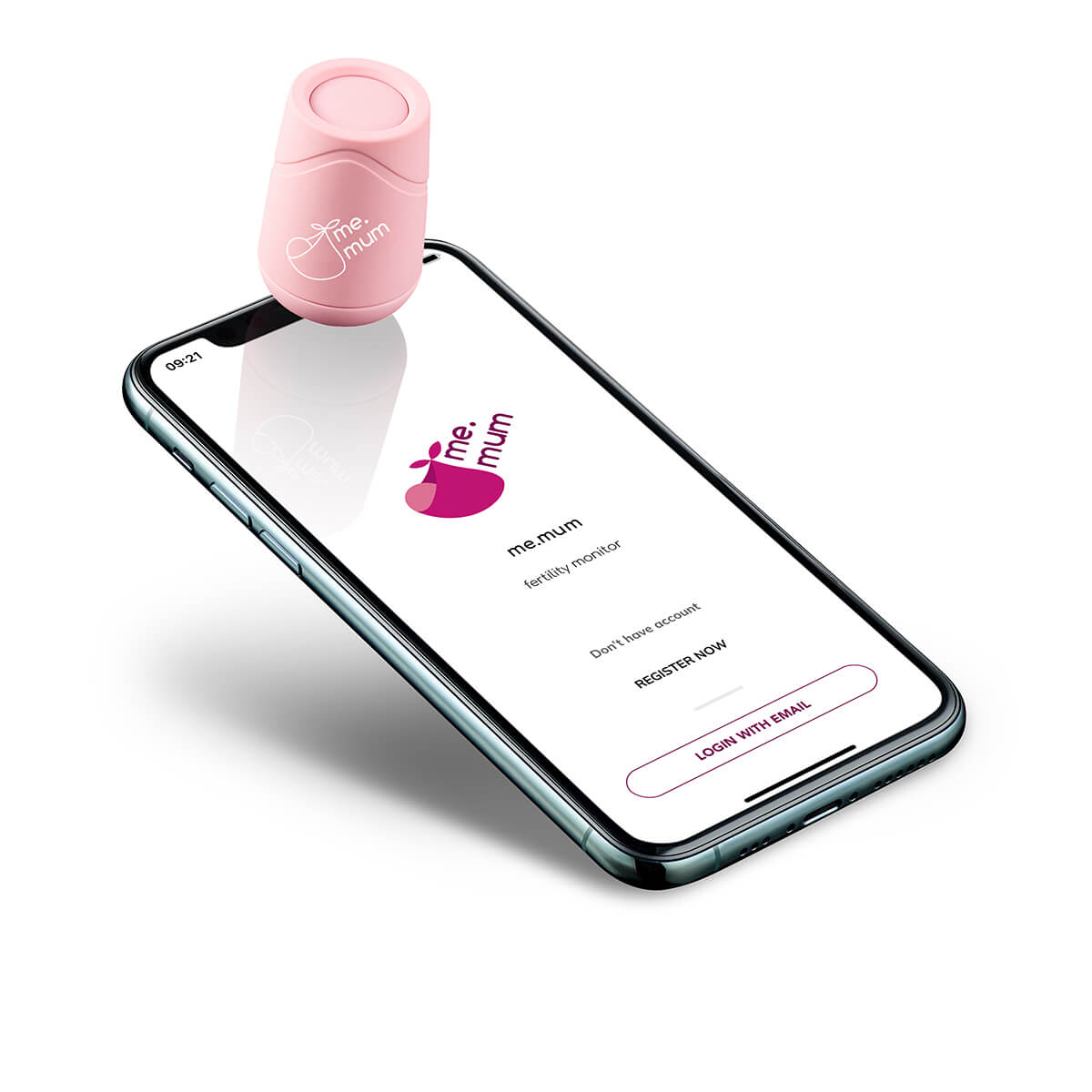
Likewise, the me.mum crowdfunding campaign is still in effect, with 25 more days for all those willing and interested in collaborating with its developers, who would like to hear feedback from the early users and grow the me.mum community. Also, through their crowdfunding site, you can learn more about me.mum, the team behind its development, how to use it, any updates in purchasing and shipping, and more!
For more, follow Made in Croatia.
Croatian Startup Revuto Aims to be Fifth Biggest Startup Investment in 2021
May the 2nd, 2021 - Croatian startups are becoming more and more well known on the international scene as the great minds this country continually produces take to the world stage in various entrepreneurial and innovative forms. The Croatian startup Revuto is just one of them, and it is aiming to become the name to hold the fifth highest startup investment this year.
As Bernard Ivezic/Novac writes, the Croatian startup Revuto has announced that it is entering an investment round with which it aims to become the holder of the fifth largest startup investment this year. The company's ambitious plan is to raise a massive nine million euros in capital.
In the first quarter of this year, Croatian startups attracted more than a billion kuna in investments. The largest investment, from Porsche, was received by Rimac Automobili, followed by Endava's acquisition of Five, the Menlo Ventures investment in Photomath, then Swisscom Ventures and their investment in Cognism, followed by the M + Group's entry into the Croatian startup Bulb.
The Croatian startup Revuto would jump from a target of about 11 million US dollars and be just between Cognism with 12.5 million dollars and Bulb with 8.5 million dollars.
Revuto, launched by Josipa Majic and Vedran Vukman, is developing an application (app) that would manage an individual's subscriptions - from Netflix to Apple and from Google to PlayStation, even including the likes of Tinder, Spotify and Asana. The idea is that on this mobile application, users will be able to manage their monthly subscriptions as they do with video or virtual machines. They could pause, cancel, pay, track and add, all in one place.
More will be known in the next ten or so days as the startup plans to officially present its investment round and start raising funds.
The Croatian startip Revuto was initially conceived for the payment of subscriptions, and therefore has an internal user reward system. It was this option that the Croatian startup launched at the beginning of last year, just before the pandemic struck, when it invited users to subscribe to its website and collect reward points, which can be exchanged for subscriptions, or so-called Revuto tokens. However, in order to be able to use them, it was of course necessary for the startup to launch a mobile application, which has been announced for the autumn of this year, ie after raising fresh capital.
Rewarding users is also important because the Croatian startup Revuto intends to compete with PayPal and Revolut with its functionality. Both parts of their popularity are due to the possibility that subscriptions can be managed through them in one place, but not even close to the level promised by Revuto.
So far, the wildly popular Revolut has gone the furthest here, as it allows you to leave credit card numbers that you have virtually created within Revolut's application to various Internet services, which you can turn off or cancel at any time. This actually allows for unsubscriptions, as the online service can no longer be charged given that you have cancelled your ''virtual'' card.
However, apart from the size of the new Revut investment round, the way in which it will be implemented is also of interest. This is the first major decentralised finance (DeFi) project in all of Croatia. DeFi, after the inital coin offering (ICO), which were the crypto counterparts of the IPO, went a step further.
Investors in DeFi seek earnings not only through tokens or cryptocurrencies, but also through the actual use of financial instruments that are created through DeFi. The Croatian startup Revuto has announced on its website that it plans to issue a REVU token on the Cardano blockchain and that it will have several interesting applications to boast of.
Cardano’s cryptocurrency, ADA, is the sixth largest in the world with a market capitalisation of more than 42.5 billion dollars. The top five are Bitcoin, Ether, Binance coin, Ripple and Tether.
The Croatian statup Revut's interest in joining DeFi isn't particularly surprising, as it experienced a big jump a couple of years ago. With 40 million dollars invested in such projects back in early 2019, it has exceeded 40 billion dollars to date. That's why it remains the focus of investors' interest in the crypto world today. However, it should not be forgotten that it is high-risk, that many compare the risk of investing in DeFi with that of ICOs, and that there are those who have been very badly burned because of DeFi projects.
How Revuto's planned DeFi will fare remains to be seen, as they are still explaining their business model. They state that the average European consumer spends 130 euros a month on subscriptions, which is about five percent of their total monthly consumption.
''Almost a fifth of consumers never check their subscriptions, which is why half of them often pay for products and services that they either no longer use or do not consider valuable. Revuto, a Croatian startup whose mission is to completely redefine the experience of subscription management and save its clients time, energy and money, has achieved sensational success. With the strong support of Cardano, a blockchain platform, Revuto is entering the first token hall on that platform with the aim of raising eight million euros of capital,'' they concluded from the startup.
For more on Croatian startups, follow our business page.
Croatian Startup Investments Reach Over Billion Kuna in 3 Months
April the 27th, 2021 - When it comes to Croatian startup investments, things have been going excellently in the first three months of 2021 despite the ongoing coronavirus crisis and all of the economic woes it brings with it.
As Bernard Ivezic/Novac writes, In the first quarter of 2021, Croatian startup investments reached more than one billion kuna in total, as was stated in the analysis of Novac.hr.
Although the figure stands at more than 170 million US dollars, it isn't a total amount because the value of some major transactions hasn't yet been made public. Some examples of figures that aren't yet known include the numbers behind Ispsos' purchase of the most successful Croatian marketing startup, DotMetrics, Infobip's acquisition of Shift, as well as the value of M + Group's investment in the domestic startup Bulb. The latter is speculated to be at the level of seven million euros.
Frane Sesnic, the director of ZICER, says that it was only a matter of time before the achievements of the Croatian startup scene would come to light.
''All of those results come after long and persistent investments, knowledge, time and money, and these aren't merely overnight successes. This is just the beginning of a new stage of Croatian entrepreneurship based on knowledge, which is proving to be successful and globally competitive,'' he stated.
The largest startup investment in the first quarter was of course Porsche's 70m-euro investment in Rimac Automobili. The market value of Mate Rimac's company has since jumped to a massive 978.5 million US dollars and it is certain that by the end of the year it will achieve its so-called unicorn valuation, ie a market value of more than a billion US dollars.
The second largest of the Croatian startup investments in the first quarter of 2021 was the 250 million kuna exit of one of the largest mobile application manufacturers in Croatia, Zagreb's Five. It was taken over by the British company Endava and is the second largest startup exit in Croatia so far, just behind Nanobit.
Artificial Intelligence (AI)
In third place is Photomath’s 23 million US dollar investment round. A VC fund from no less than the Silicon Valley, Menlo Ventures, has invested in the startup, which was started by Damir Sabol and which boasted that its artificial intelligence is used by a million people a day. The Croatian-British startup Cognism is the fourth largest investment in the quarter, it received 12.5 million dollars from Swisscom Ventures, the VC fund of the largest telecom of the same name in Switzerland.
It's worth mentioning that Cognism, which has developed a cloud system that allows companies to use Internet technologies to improve sales and marketing, is one of the fastest growing companies in the investment portfolio of South Central Ventures.
Vedran Blagus, an investment manager at South Central Ventures, says that given the fact that startups have been building their story globally for more than a decade now, it isn't unusual to see their apparent “overnight success” now.
''If we go back only a year or two, activities on the Croatian startup or technology scene were sporadic, at least in terms of their size and the amount of investments and acquisitions which took place, now they've placed Croatia on the map for large foreign investors and partnerships in terms of acquisitions and investments,'' said Blagus.
Green technologies
It is also worth mentioning that M12, Microsoft's VC fund, invested 12.5 million dollars in Memgraph, a Croatian startup with whose technology another Facebook can be created.
Of the Croatian startup investments that exceed eye-watering amounts, there is also the investment of 10 million kuna received by the Osijek startup Orqa from the Hungarian fund Day One Capital, as well as smaller investments in various startups. The startup ecosystem in Croatia has become richer for the BIRD Incubator, the first to specialise in artificial intelligence startups. SPOCK, the incubator of the largest technological faculty in Croatia, Zagreb's FER, was reactivated, and ZICER, the largest startup hub in our country, showed the results of as many as eight local green startups.
In addition, the American analytical company ABI Research named Gideon Brothers the fifth most successful manufacturer of autonomous robots for the transfer of cargo in the world, and the largest VC fund in Croatia, Fil Rouge Capital, was named the second most active such fund in Central and Eastern Europe.
For more on Croatian startup investments and domestic companies, make sure to follow Made in Croatia.
Artists, Musicians and Creatives - Meet Croatian Startup AymoLive.com
March 31, 2021 - During a year of being bombarded with Zoom calls, social media, and outrageous news, it was only time before a more uplifting and inspirational online offer came along. With the world in lockdown, gigs and concerts indefinitely stopped and individuals more isolated than ever, the team at Aymolive.com were busy working away thinking how to reconnect creatives.
Vanja Perić, one of the cofounders of Aymolive reminisced about spring 2020 and how the idea was born. “As someone who would go to concerts on a regular basis, bars and cafes closing really hit home, as it removed that ability to watch artists live and engage with them after.”
“We’re also connected to the creative scene in Croatia, with friends and family members part of bands like Young Shuttle, the national theatre and artist collectives like Split Nomad Gallery, and seeing all of those suddenly close was tough on us all”, added Jana Šaljić, the second of three cofounders.
Poets and artists, from Croatia to Canada
After going live this year, they’ve attracted the likes of poets, writers, artists, bands, painters and actors from places locally like Croatia and Slovenia to those further afield like Canada and the UK. Most recently they’ve partnered with nightclub Judino Drvo for their live streaming fundraising sessions happening over the coming weeks.
“Knowing the increase in live streaming but through massive channels that prioritise profit over art, we wanted to enter the space with something a bit more personal and targeting those who may not have a large audience yet. Our main focus is on creating a community of creatives to share their talent, and when places like HULU Split or Judino Drvo got in touch, it confirmed our original value proposition.”, concluded Ivan Magaš, the third cofounder who himself has entertained the AymoLive audience with his traditional bottle weaving.
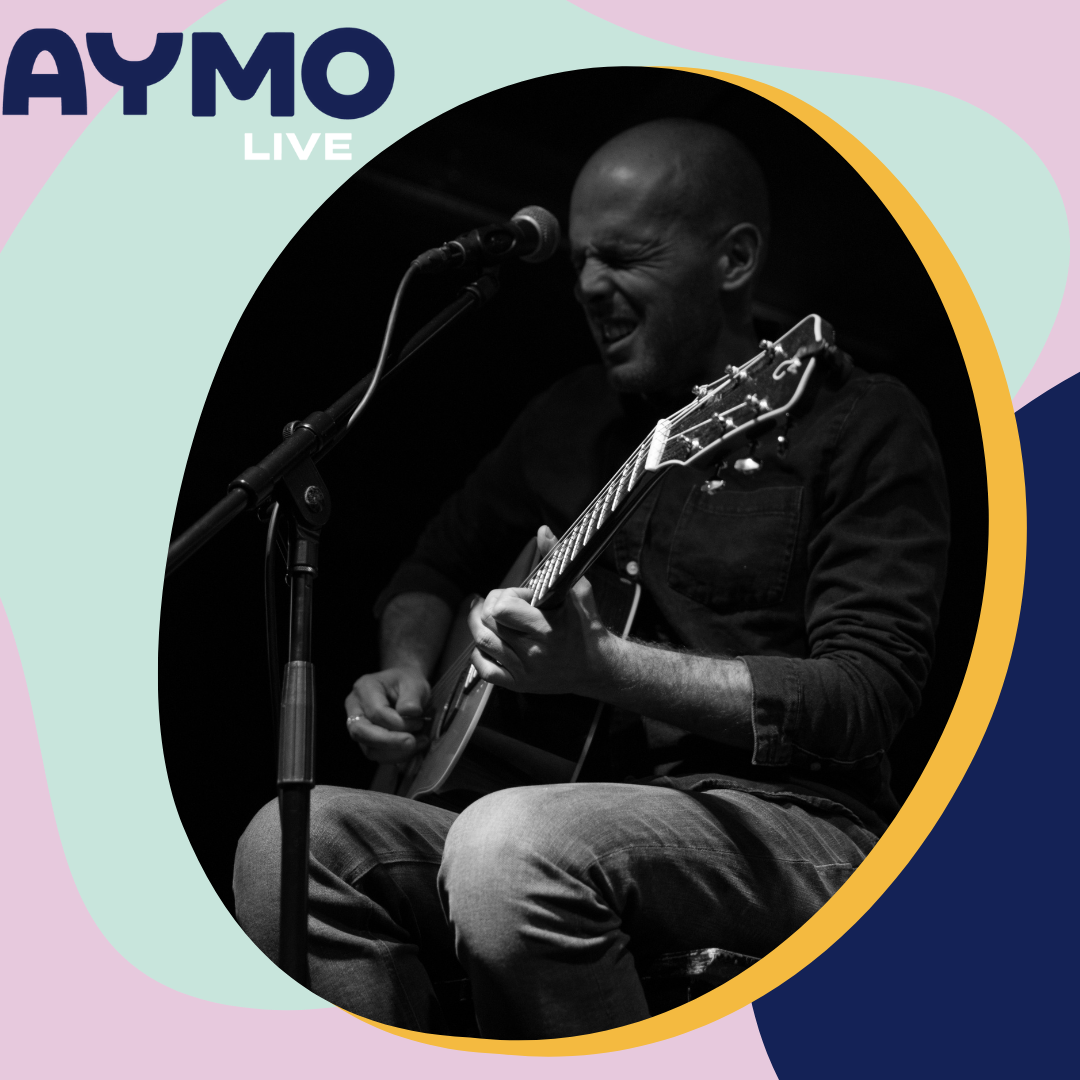
The future of live performances
As we spoke more about the platform and the individuals and groups AymoLive were trying to reach, it was clear that there was a strong feeling to get the creative scene from the Balkans out there to the wider world.
“We want and can’t wait for live in-person performances to return, however they limit creatives to a location. Through AymoLive we want to enable creatives to reach new audiences within the AymoLive community, on a platform made for them”, explained Jana as she showed us the website.
“That’s where we outdo Facebook and Twitch, where you are hidden behind pet videos or gamers. AymoLive is a place only for creatives to showcase to people looking for others who can inspire and support them”.
If you’re a creative, check out their site, sign up and stream for free today. Also get involved with the Judino Drvo live stream fundraiser over the coming weeks, and support the creative community.
For more stories of Croatian excellence and innovation, check out the TCN Made in Croatia section.
Pioneers of First Croatian Electric Scooter Announce Crowdfunding Campaign
March 25, 2021 - In a time and place where people are desperately searching for transport solutions to environmental problems, car traffic, crowds, and limited amounts of parking, especially during the tourist season at hotels and parks, the Croatian company IDDI decided to step forward and design the first Croatian electric scooter.
IDDI d.o.o. has announced their crowdfunding campaign on the Croatian platform CroInvest this week, where the goal is to raise the amount of HRK 250,000 for the completion of production and for R&D to make the world's first electric scooter from biodegradable materials.
IDDI, under the Rolla brand, has developed a product package consisting of the first Croatian electric scooter with a charger and a mobile application, designed and developed for the rental concept. The team, lead by Ivan Šimatović, consists of a group of young visionaries and engineers who want to prove to everybody that Croatia is ready to design and produce high-tech products and be part of the solution to the global problem of transport and climate change.
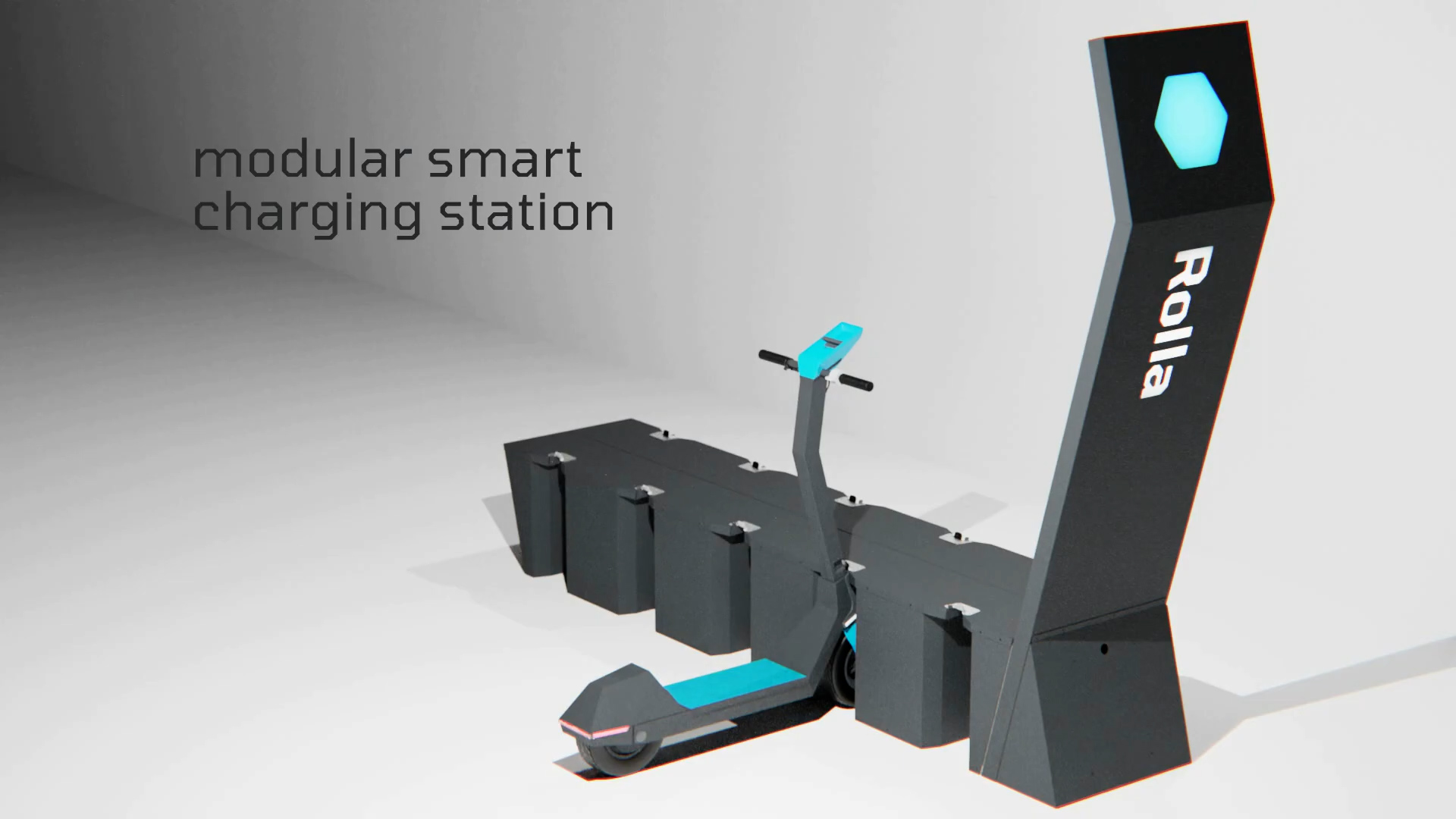
The Rolla charging station (Image: IDDI d.o.o.)
By offering high-performance scooters, advanced safety systems, and smart sensors that limit speed in populated areas at an affordable rental price, IDDI wants to change the negative public perception caused by the use of inappropriate and often insufficiently safe electric scooters. The Rolla scooter is also weather-resistant and has all-terrain big wheels, allowing it to adapt to almost any circumstance.
Take a better look at the Rolla product package:
According to the team, the Rolla project will also offer its users the opportunity to enjoy the beautiful outdoors and tourist attractions in Croatia, such as the Plitvice Lakes, in a more innovative and interesting way. The company has signed contracts with 4 renowned Croatian hotels for this tourist season, and the plan for the delivery of scooters is planned for mid-April.
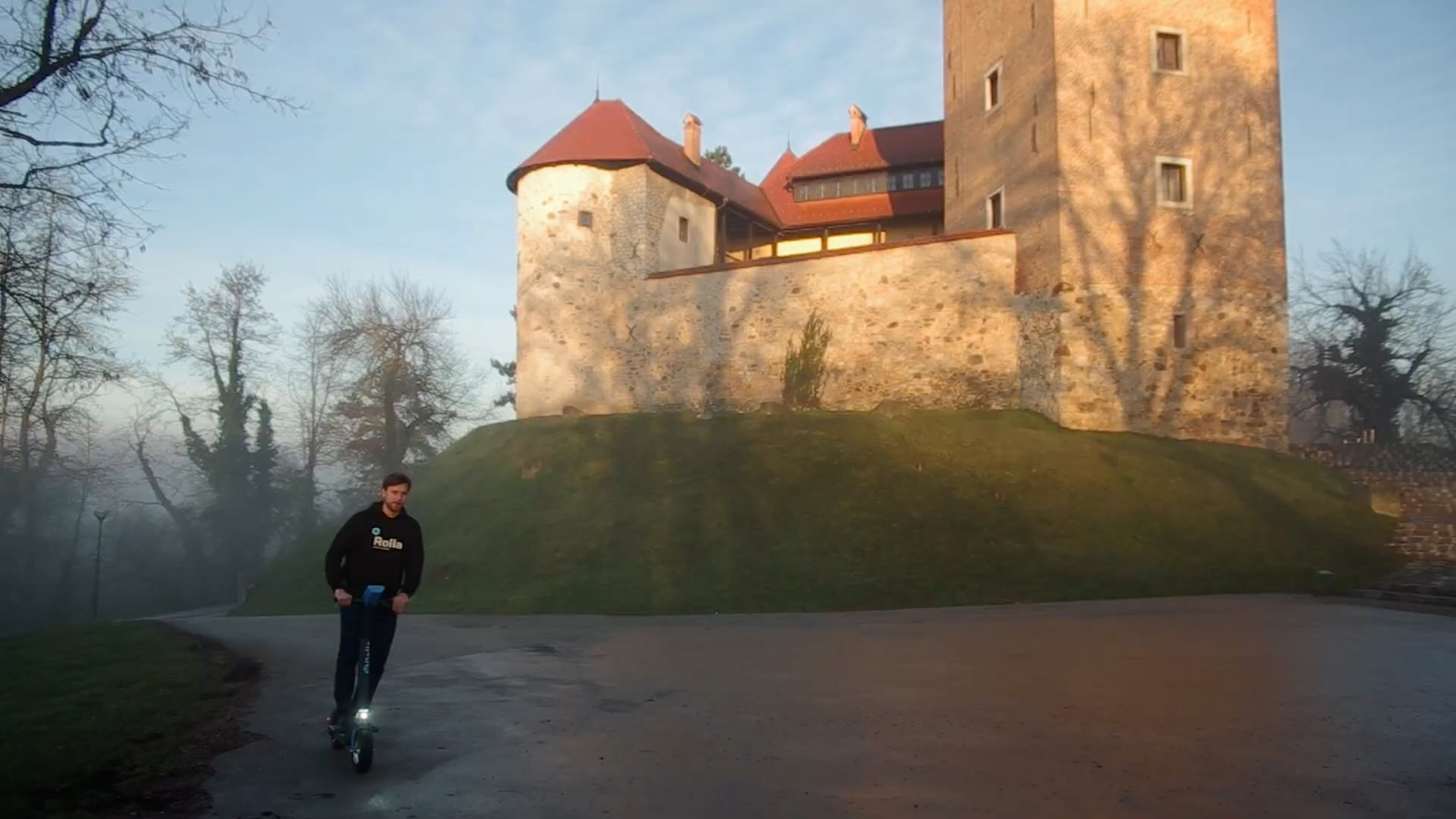
Rolla isn't made just for the city, but for almost anywhere in Croatia. (Image: IDDI d.o.o.)
IDDI d.o.o. and the Rolla project have been already recognized by HBOR (the Croatian Bank for Reconstruction and Development) through the credit line entrepreneurship of young people, women, and beginners under the guarantee of ESIF, and has close cooperation with Croatia’s National Tourist Board.
Learn more about the Croatian innovators behind the project:
You can read more about the project HERE.
For more about everything made in Croatia, be sure to follow TCN’s dedicated page.
Croatian Startup Amoda and Croatia Osiguranje Offer Driver Rating
March the 25th, 2021 - The Croatian startup Amoda and Croatia Osiguranje (Insurance) have teamed up to offer a driver rating service with rewards to users.
As Bernard Ivezic/Novac writes, Croatia Osiguranje, the largest insurer in the Republic of Croatia, was the first to introduce a driver rating here on the Croatian market. On its Laqo mobile app, it has added new functionality that tracks the way a driver drives and then rates it. The brand new service, called LaqoPrevent, is the result of cooperation with the Croatian startup Amoda, which two years ago was named one of the five best InsurTech startups in the world by the highly respected Financial Times (FT).
Davor Tomaskovic, President of the Management Board of Croatia Osiguranje, says that their goal with this cooperation with the Croatian startup Amoda is to promote and reward driving safety and that is why they started the first such prevention programme here in Croatia.
"Laqo has recently become one of the strongest digital brands on the Croatian insurance market, and with the LaqoPrevent programme, we're going one step further and contributing to raising the overall level of safety in society. We'll promote and reward responsible behaviour in all aspects of life, starting now with traffic safety,'' stated Tomaskovic.
He didn't enter into any discussions about financial indicators, despite that, Croatia Osiguranje revealed that the new Laqo website was visited by more than a million people in just five months and that their calculator for calculating the price of insurance through Laqo was tested out by 125,000 people.
Ana Zovko, the director of the digital development department at Croatia Osiguranje, explained that vehicles can be secured through Laqo, but within LaqoPrevent, using telematics within the app, users can track different aspects of their ride. They can track their speed, braking mode and mobile phone usage while driving. For positive practice while driving, she noted, Laqo will reward them.
"The programme rewards good drivers, so the users with the best grades will be provided with exclusive additional coverage when contracting a new insurance policy, because we want our customers to know that we're their partner which systematically works on accident prevention,'' said Zovko.
Marijan Mumdzijev, the executive director of the Croatian startup Amodo, explained that they have developed a piece of technology that allows for the monitoring and generation of a driver rating, which is used by LaqoPrevent.
"It's a great pleasure to be a part of this project, although Amodo has users all over the world, to do something like this in ''your own backyard'' is of special importance to us and we're glad to have found a partner who, like us, isn't only ready to follow global trends, but to actually go out there and set them,'' he said.
It's also worth mentioning that the innovative solution developed by the Croatian startup Amodo is used by the largest American insurer AIG among others, followed by Triglav and P&V.
For more, follow our business section. For all current travel information, border rules, testing sites and all other coronavirus information specific to Croatia, bookmark this page.
Croatian Startups Finalists in Regional Air Pollution Reduction Innovation Contest
December the 15th, 2020 - Croatian startups are becoming more and more well known across the world in various different fields, and two in particular have stood out among the rest when it comes to air pollution reduction.
As Jozo Vrdoljak/Novac writes, the Croatian startups Jellyfish and CatSolAir System participated in the finals of the regional competition for the best innovation for reducing air pollution in the Balkans - BASF Start-up Science. The team making up the Djakovo startup, Jellyfish, which consists of leader Jurica Perko and members Zvonimir Perko and Dinko Manduric, presented their solution for integrating charging stations for electric vehicles into the existing public lighting system, while CatSolAir System is led by Lucija Radetic, an assistant from the Laboratory of Environmental Engineering at the Faculty of Geotechnics. With the help of team member Jan Marcec, they presented their idea for air purification by using solar photocatalysis in a CPC reactor.
First place went to the startup Milkywaste from neighbouring Slovenia. This Slovenian startup came up with the idea for biodegradable packaging derived from milk proteins.
"BASF Startup Science is another commendable initiative that gives young people the opportunity to start and accelerate the development of their solutions in the direction of using clean energy and working to preserve the environment. We're extremely proud that our idea was recognised and we had the opportunity to present our solution as a component of the smart concept. Congratulations to all of the finalists on their excellent ideas, we wish them a lot of success in their further development. We believe that the involvement of young and ambitious people and the changes that come with innovation will ensure a better quality of life in our communities,'' stated Jellyfish team leader Jurica Perko.
CatSolAir System Manager Lucija Radetic said she and her team have no intention of slowing down the further development of their solution.
"We were extremely honoured to be able to participate in the finals of the BASF Startup Science competition and be in such good company among the other finalists. Although we didn't win the grand prize, we're happy that our idea was recognised and included among the finalists, so we'll continue to work with even greater enthusiasm,'' she stated.
The BASF Start-up Science competition is the largest regional competition in the field of sustainable development and is intended for startup ideas from Croatia, Bosnia and Herzegovina, Slovenia and Serbia. The innovators addressed, among other things, environmental transport issues, parking solutions and opportunities for sustainable agriculture.
Simon Franko, the CEO of BASF for Croatia, Bosnia and Herzegovina, Slovenia and Serbia and one of the members of the expert jury, believes that it has been confirmed once again that this region has given the world a lot of talented and innovative young people.
'''Air quality is one of the biggest challenges of the modern age and remains a topic that is the focus of every individual. I'm extremely glad that so many good solutions for this important issue come from our region. We had the opportunity to find out how young innovators think about this topic and share our many years of experience in the field of air quality with them, and I'm especially pleased that we'll enable at least the initial development of their startup ideas,'' said Franko.
The BASF Start-up Science competition was organised by the chemical company BASF, a European leader in research and development. The competition lasted for three months, and young innovators from Croatia, Bosnia and Herzegovina, Slovenia and Serbia had the opportunity to apply for the idea of reducing air pollution. The prize fund given to the best idea was 5,000 euros.
For the latest travel info, bookmark our main travel info article, which is updated daily.
Read the Croatian Travel Update in your language - now available in 24 languages
Croatian Startup Develops Application to Monitor Spending of Public Money
As Novac/Matea Grbac writes on the 21st of May, 2020, the innovative Croatian startup, Fortis Labor, has developed an application which promotes transparency aimed at cities and associations for the monitoring of the spending of public money.
The move represents a new upgrade to their ''Email notification system'' app, better known as SOM. Although the whole system was created primarily as an auxiliary tool for sports associations, it quickly became clear that it could quite easily be applied to all kinds of associations, and that it can also serve as a tool for the more clear cut and transparent monitoring of the distribution and spending of earmarked funds paid from the city budget.
Its main feature, points out the founder of this Croatian startup, Lorenzo Gasparic, is that the application can be accessed from any device, whether it is a mobile phone, tablet or simply a laptop.
''Through this system, the city always has an insight into how and in what way public money is being spent. So far, this hasn't been possible. Namely, at the beginning of the year, the city would announce a public tender to which associations would apply, which would then be allocated a certain part of those funds. They would then justify the money spent to the city only at the end of the year by submitting a yearly report. In this way, through a just a few clicks, associations can immediately enter data, or attach an invoice for the funds spent, and this information is then visible to everyone and is made available in real time,'' he explained.
In addition to easier and faster entry of invoices, associations have an insight into the remaining funds through this Croatian startup's useful system, while cities receive all the data in one place, and a more transparent way of doing business with reduced paperwork is thus provided.
Gasparic added that this system is really impossible to cheat because even if someone receives funds for one item, and tries to justify the money spent in some way when it was actually spent on something completely different, everything is always made perfectly clear through this system and there can be no such cover ups.
''Let's put it this way. If some association has received funds for the maintenance of a field, and instead a bill from the restaurant is attached and someone accepts it as a valid excuse, later on, during the check, someone can catch you committing that sort of fraud. Which person approved it remains in the system, and I doubt that someone would risk playing with their own career by trying to cheat like that,'' he noted.
Currently, this Croatian startup's system is used by about 200 associations which are mostly sport oriented, they're from Bjelovar, Sisak, Vodnjan and Rovinj, while Vrbovec was the first to use this system to monitor the work of 89 sports and non-sports associations within the city.
''We started engaging in negotiations with cities back at the beginning of the year, and now we have five more cities that want to use our system. Of course, these conversations have now come to a halt due to the coronavirus crisis, but our goal is to offer our application to everyone. I think that only now, after the pandemic, has it become clear just how important transparent and digital business truly is,'' he said.
The value of the entire project stands at a huge 1.3 million kuna, of which 80 percent has come from European Union funds, which marks the second project of a Croatian startup from Zagreb financed in this way. Fortis Labor doesn't plan on stopping there, either.
Next year, they plan to offer cities a similar programme through which the digitisation of applications for public tenders can be enabled. In this way, they would connect the new system with the existing one and thus almost eradicate the infamous and daunting Croatian paperwork which is typically involved in such processes.
For more, follow Made in Croatia.
GENOS: From Croatian Startup to Laboratory Attracting Foreign Scientists
As Index/Marko Repecki writes on the 16th of February, 2020, founded back in 2007, Genos was the first academic Croatian startup to grow into a serious lab which currently employing some 50 experts, half of whom have PhDs and are world leaders in some areas, such as glycan research.
In addition to Croatian scientists, experts from abroad are also coming to Genos, which is not surprising given that back in 2013, the renowned scientific journal The Scientist declared it the "Best Place to Work" in the world, in competition with 240 biomedical and biotechnology companies.
They were able to develop a GlycanAge test that allows you to look into the onset of certain diseases, such ones which can cause heart attacks or strokes, and then work to prevent them.
Could Zagreb could become a centre for pharmacogenomics for Europe?
In addition, Genos founder Goran Lauc announced major plans in the field of pharmacogenomics, which is very important in personalised medicine, in a recent Index interview.
"Genos was founded in 2007 and at the beginning we were mainly concerned with genetics, we did various genetic tests. Even then, we launched some tests that were the first of their kind in the world. For example, we were the first to do a prenatal paternity test - it's a test that can be done before the baby is born. A year or two later, we switched to glycans, but we still have a part of the lab where genetic tests are done. We're now developing pharmacogenomics in collaboration with St. Catherine Hospital and the Mayo Clinic in the US, and we hope that in this shared story, we will be able to achieve a pharmacogenomics centre for Europe in Zagreb,'' says Lauc.
Pharmacogenomics, the next area in which Genos has ambitious plans, allows patients to get exactly the medicine they need. This reduces the side effects of drugs and the possible harm that may result from taking drugs they don't require.
"In pharmacogenomics, genetic testing is done, the human genome is analysed, and then based on the information they receive, one can determine which drug really helps the patient and at what doses and which drug he should not take. Today, when you go to the doctor, he doesn't really know anything about you. He asks where it hurts, measures your temperature, listens to your heart, but realistically knows nothing about you and gives you a drug at random, one that he thinks might help, and that's why we're in a situation where two-thirds of medication doesn't help.
Your doctor prescribes you one medicine, so if that doesn't help, he prescribes a second and then a third, and so it goes on. The problem is that if the drug doesn't help, it often does harm. In the US, about 100,000 people die annually due to getting the wrong treatment. Pharmacogenomics solves this problem because it allows the patient to be prescribed exactly the medication that will benefit them. This is an example of how genetic analyses have gone into clinical use, but this is still not routinely applied worldwide.
In Croatia, the most was done by St. Catherine's Hospital, which, as a private hospital, referred a large number of its patients to this, thus obtaining safer treatment. We, in cooperation with them, want to create a laboratory that will conduct these analyses not only in Croatia but abroad as well. We want to make a central laboratory for Europe for this type of testing,'' says Lauc.
''What's strong about Genos is glycans. Glycans have been investigated as potential biomarkers in personalised medicine since relatively recently. In fact, we were the first to start doing major studies on glycans, on a large number of people, sometime back in 2008.
We're one of only two or three labs in the world where major glycan studies can be done, and when someone at Harvard wants to do something with it, they send their samples to us. Right now, we have in the lab a large cohort from two thousand twins from whom blood samples were taken three times over a 15-year period. This was collected at Kings College London and sent to us for analysis.
Less than a month ago, the result of a major survey of 27,000 people whose samples were collected in Germany 20 years ago, of whom 800 had diabetes, 500 had suffered heart attacks or strokes, and we can predict on the basis of glycans who will end up in which category. So, if I test my glycans today, I will know if I have an average risk of having, for example, a stroke, or if my chances are above average.
The idea is that glycan testing should one day go into routine checkups, like measuring your blood glucose or liver enzymes today, so this test could work. Our GlycanAge test is expensive, so it isn't sold much in Croatia, so our primary channels are selling it to longevity clinics worldwide.
There are many centres around the world where people who want to live longer and healthier try to prevent diseases. People mostly go to the doctor when they're already ill, our western medicine treats a sick man, and when a person is sick, it means that some system is no longer working. The idea of longevity medicine is to try to motivate people to do what's good for them. We all more or less know what's good for us, but we actually don't do anything about it. Why don't we? Because we don't see the effects. Until at some point something bad happens,'' Lauc says.
Genos is also very interesting to scientists as an employer, and besides scientists from Croatia, people from abroad come to work for Genos.
"We currently have 50 people in Genos, 24 of them have PhDs. We're one of the strongest conglomerates of highly educated people focused on one story. In the last 12 years, only two people have left us. I try to make people feel good here and then they stay. We have no problems finding experts, they come to us not only from Croatia but also from abroad, so 14 foreigners have worked or currently work with us so far. One colleague from Russia has been here for seven years, then there's another from Canada, who has been working here for four years, we're just receiving one Indian, etc,'' says Lauc.
Make sure to follow our dedicated Made in Croatia page for more.
STEMI: Croatian Startup Raises First Million Kuna in Less Than One Hour
As Poslovni Dnevnik/Bernard Ivezic writes on the 28th of November, 2019, in less than an hour, the amazing Croatian startup STEMI raised over one million in capital (154,000 euros) to expand its operations in the USA and Germany.
The group investment campaign at Funderbeam SEE for the Rijeka-based educational and technological (edtech) startup STEMI, which celebrated with the first Croatian educational robot Hexapod, has now set a new investment record in Croatia with its incredible acheivement. So far, nobody on the entire platform, jointly run by the Estonian Funderbeam and the Zagreb Stock Exchange, has managed to reach their first million so quickly.
In addition, STEMI has set a modest monthly target of 2.25 million kuna (300,000 euros) and has exceeded half of the minimum capital required to successfully complete this funding round. Marin Trošelj, co-founder and director of STEMI, says that in case of higher demand, the campaign will increase. "We offer 6.25 to 10 percent shares in STEMI for a stake of 300-500 thousand euros," Trošelj stated.
In his presentation at the Zagreb Stock Exchange, he revealed several facts that could explain the significant investor interest STEMI can boast of. In addition to being a new key product with which to expand, licenses for STEM education as a service, which has already been successfully tested over in the United States, the startup's founder stated that its market in the US and EU is as high as 360,000 schools. It already has a partner in a new niche in the US and is just about to sign a contract with another partner closer to home in Germany.
Furthermore, in its presentation to investors in Rijeka, STEMI's rapid growth of income and profitability was also mentioned. In 2020, STEMI expects 1.6 million kuna in revenue, a year later it expects 13.5 million kuna, and in 2022, with expected revenue of 39.9 million kuna, it expects to make a profit for the very first time.
A year later, revenue should jump up to above 90 million kuna, to an incredible 203.6 million kuna in 2024.
"In high school education, we're better positioned than Lego, we offer more, and we have a successful pilot and demand," Trošelj stated.
Make sure to follow our dedicated business and Made in Croatia pages for much more.


